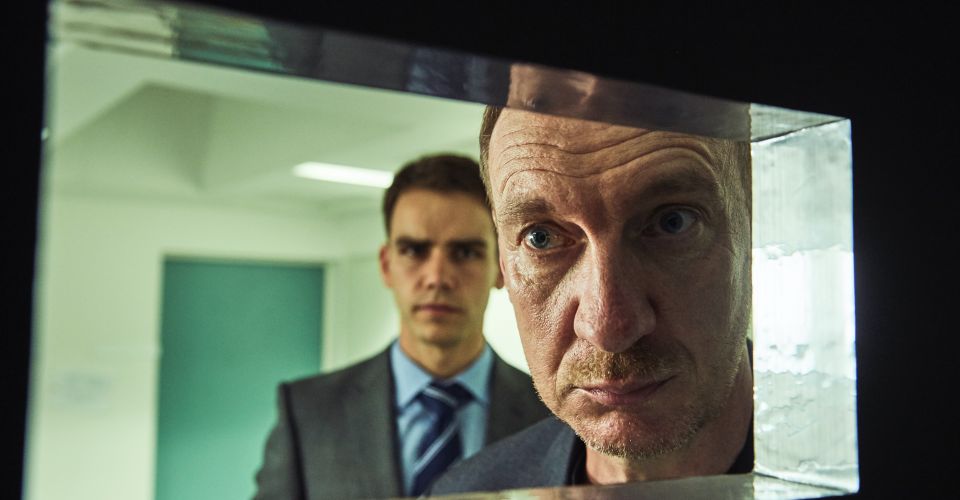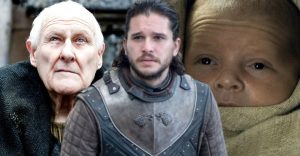The Feed Review: This Technophobic Terror Plays Like An Extended Back Mirror Episode

Now that Netflix’s Black Mirror is a certified Emmy-winning machine, it makes sense why Amazon would be interested in pursuing something like The Feed. The series, a technophobic nightmare about an ultra-connected, always on society, whose citizens (the vast majority of them, anyway) have their brains literally hard-wired so as to turn themselves into their own personal computer and/or smartphone, plays like an extended episode of Charlie Brooker’s often grim accounting of where humanity is headed. As such, the series’ approach to its dystopia-adjacent narrative will seem tantalizingly familiar and readily understood by its intended audience.
Much of the success of Black Mirror can be attributed to both the relative brevity and variety (or the illusion thereof) of its stories. The Feed, then, takes a major risk in its attempt to track a single storyline over the course of eight hours. The appeal is simple: The Feed provides an opportunity for the viewer to spend more time in a world where technology has not only dramatically altered the lives of everyday people, but made them even more reliant on it than ever before. The expansive nature of the program and the chance to experience more of how these characters live and the ways in which their day-to-day existence is affected and controlled by this ubiquitous technology is certainly appealing. But, much like Black Mirror, The Feed soon outstrips any intrigue inherent in its central premise and must then shift its focus to a fairly mechanical mystery and rather oversimplified investigation of what privacy means and what personal data is up for grabs in an ultra-connected world.
The series, from executive producer and writer Channing Powell, has some lofty goals and is eager to play around with the speculative technology from which it derives its title. The Feed is a neural network implant in human brains that gives them the ability to access nearly anything they want. In addition to freedom of communication, music, and entertainment, as well as the ability to live-stream their experiences to anyone in their feed, the environment itself has become an augmented reality playground, where QR codes can transform the world — or individual people — into something wondrous. The series leans into its world building early on, as a way of not only illustrating the prevalence of the Feed, but also introducing the family that ostensibly controls it.

The Hatfields are like if Elon Musk, Jeff Bezos, and Bill Gates were rolled into one supremely wealthy, powerful, and, of course, dysfunctional clan. The Hatfields are headed up by Lawrence (David Thewlis), the architect of the Feed and head of the company that runs it, as well as his wife Meredith (Michelle Fairley), who ostensibly serves as the face of the company and maintains its public image. Sons Ben (Jeremy Neumark Jones) and Tom (Guy Burnet) represent the future of the Feed and how divisive it is becoming. While Ben is devoted to the family business — at the expense of his personal life — Tom is a psychologist who has distanced himself from the empire. That distance proves difficult to maintain when he meets and marries Kate (Nina Toussaint-White).
The series attempts to set up a conflict between those using the Feed and a small but vocal minority who adamantly oppose its use. In addition, The Feed introduces a central mystery, wherein certain users lose control of their bodies and commit horrible crimes against their will, before gouging their own eye out. This hacking is the driving force behind the story, and though it presents a potentially engrossing mystery for the characters to solve, one that involves the Hatfields knowingly disrupting and violating their users’ privacy, it struggles to be compelling enough to justify the series’ eight-episode length. The result is a series with a fascinating premise that nevertheless stumbles in its attempts to deliver a propulsive narrative in the longterm.

The Feed is not short on ideas, using the threat on everyone’s feed as a way to explore Kate’s fears as a new mother, or instigate trouble with Tom and Kate’s friends, Evelyn (Clare-Hope Ashitey) and Max (Osy Ikhile), but these domestic concerns rarely flesh out the story in a way that satisfyingly moves beyond repeated examples of the Feed’s ubiquity. Moreover, because the series must continually remind the audience of its premise, in order to move the story forward, episodes become bogged down in their own repetition.
Ultimately, The Feed’s length is a disservice to its central ideas, as its story is quickly spread too thin over the vast runtime. Though it excels in its fantastical world building, the show demonstrates how sometimes big ideas are better served by coming in small packages.
The Feed streams on Amazon Prime Video beginning Friday, November 22.
About The Author


















